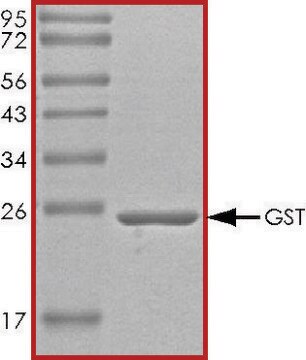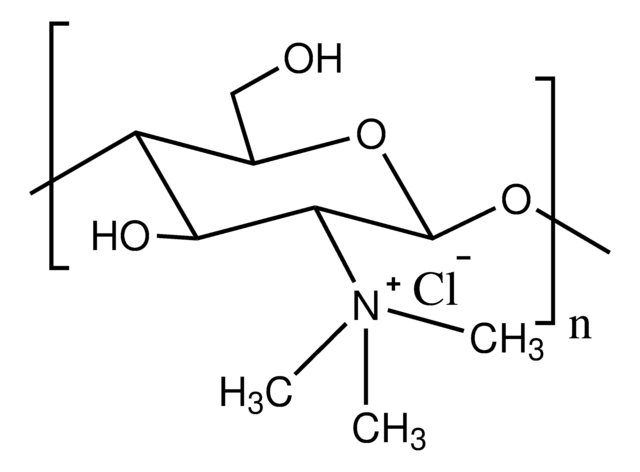GS64
GST A4-4, Recombinant Human
Sinônimo(s):
GTA4, glutathione S-transferase alpha 4
Faça loginpara ver os preços organizacionais e de contrato
About This Item
Código UNSPSC:
12352200
NACRES:
NA.26
Produtos recomendados
fonte biológica
human
Nível de qualidade
recombinante
expressed in E. coli
Ensaio
>95% (SDS-PAGE)
forma
frozen liquid
atividade específica
3.68 units/mg protein
peso molecular
25 kDa
concentração
1.01 mg/mL
temperatura de armazenamento
−70°C
Informações sobre genes
human ... GSTA4(2941)
Descrição geral
using spectrophotometric determination of 1-chloro-2,4-dinitrobenzene (CDNB) conjugation with reduced glutathione (1 mM) in 100 mM NaPO4 (pH 6.5) at room temperature.
Ações bioquímicas/fisiológicas
Glutathione S-transferase alpha 4 (GSTA4) is an enzyme that in humans is encoded by the GSTA4 gene. Glutathione S-transferases (GSTs) are a family of enzymes that play an important role in detoxification by catalyzing the conjugation of many hydrophobic and electrophilic compounds with reduced glutathione. Based on their biochemical, immunologic, and structural properties, cytosolic and membrane-bound forms of glutathione S-transferase are encoded by two distinct supergene families. At present, eight distinct classes of the soluble cytoplasmic mammalian glutathione S-transferases have been identified: alpha, kappa, mu, omega, pi, sigma, theta and zeta. The GSTs are thought to function in xenobiotic metabolism and play a role in susceptibility to cancer, and other diseases.
This gene encodes a glutathione S-tranferase belonging to the alpha class. The alpha class genes, which are located in a cluster on chromosome 6, are highly related and encode enzymes with glutathione peroxidase activity that function in the detoxification of lipid peroxidation products. Reactive electrophiles produced by oxidative metabolism have been linked to a number of degenerative diseases including Parkinson′s disease, Alzheimer′s disease, cataract formation, and atherosclerosis.
Armazenamento e estabilidade
The enzyme should be used by the end-user customer within 1 year of receipt.
Código de classe de armazenamento
10 - Combustible liquids
Classe de risco de água (WGK)
WGK 1
Ponto de fulgor (°F)
Not applicable
Ponto de fulgor (°C)
Not applicable
Certificados de análise (COA)
Busque Certificados de análise (COA) digitando o Número do Lote do produto. Os números de lote e remessa podem ser encontrados no rótulo de um produto após a palavra “Lot” ou “Batch”.
Já possui este produto?
Encontre a documentação dos produtos que você adquiriu recentemente na biblioteca de documentos.
Yongzhen Yang et al.
Toxicology and applied pharmacology, 230(2), 187-196 (2008-05-20)
Our recent work in endothelial cells and human atherosclerotic plaque showed that overexpression of glutathione-S-tranferases (GSTs) in endothelium protects against oxidative damage from aldehydes such as 4-HNE. Nuclear factor (NF)-kappaB plays a crucial role during inflammation and immune responses by
Larissa M Balogh et al.
Biochemistry, 49(7), 1541-1548 (2010-01-21)
Conjugation to glutathione (GSH) by glutathione transferase A4-4 (GSTA4-4) is a major route of elimination for the lipid peroxidation product 4-hydroxynonenal (HNE), a toxic compound that contributes to numerous diseases. Both enantiomers of HNE are presumed to be toxic, and
Fabio Coppedè et al.
Mutation research, 579(1-2), 107-114 (2005-08-02)
Several lines of evidence, including an increased level of lipid peroxidation and the depletion of antioxidant molecules like as glutathione (GSH), indicate that oxidative stress plays an important role in the pathogenesis of several neurodegenerative disorders, such as Parkinson's disease
Ji Qian et al.
Molecular carcinogenesis, 48(3), 253-259 (2008-09-04)
GST Alpha 4 (GSTA4) has an important role in the protection against oxidative stress induced by carcinogens such as tobacco smoke. However, few studies investigated the association between GSTA4 polymorphisms and lung cancer risk. We genotyped three selected GSTA4 SNPs
Kaname Uno et al.
Molecular carcinogenesis, 50(10), 781-790 (2011-07-14)
Oxidative stress might participate in the carcinogenesis of human esophageal squamous cell carcinomas (hESCC). 4-Hydroxynonenal (HNE) is a major product of membrane lipid peroxidation with short life. It might act as an important mediator through the generation of adducts and
Nossa equipe de cientistas tem experiência em todas as áreas de pesquisa, incluindo Life Sciences, ciência de materiais, síntese química, cromatografia, química analítica e muitas outras.
Entre em contato com a assistência técnica






